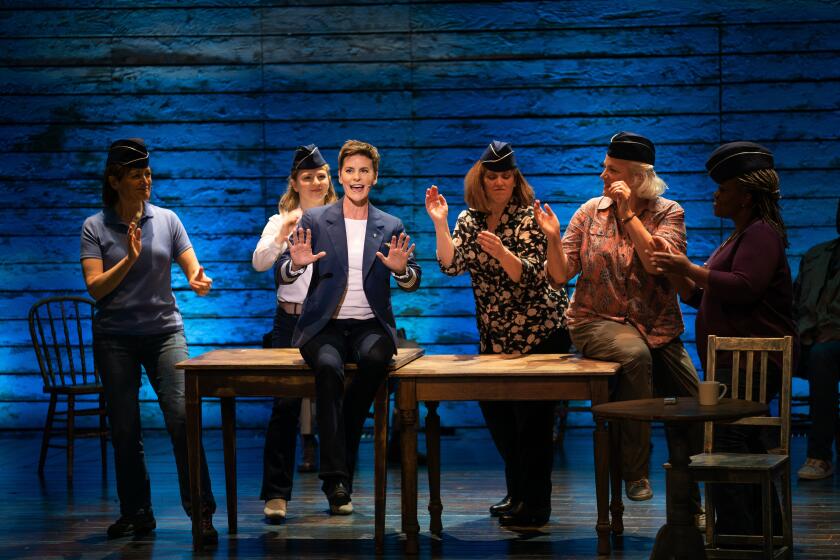Review: Liza plus Aristophanes equals the bedazzling camp of ‘Lizastrata’ at the Getty Villa

Aristophanes wasn’t shy about incorporating a parade of phalluses in his comedies, and neither is Troubadour Theater Company in “Lizastrata,” an appropriately bawdy riff on one of the ancient Greek playwright’s best-loved works.
Yes, you got that right. That’s Lysistrata with a Z sandwiched between an I and an A, because in this campy remake, the protagonist who famously organizes a sex strike among Greek women to put an end to the ruinous war between Athens and Sparta owes half of her theatrical DNA and nearly all of her sequins to Liza Minnelli.
The annual outdoor presentation of an ancient classic at the Getty Villa’s Barbara and Lawrence Fleischman Theater is not usually such a rollicking and risqué affair. It felt almost sacrilegious to be cackling, shimmying and occasionally blushing in my seat at the majestic Pacific Palisades venue, where just a stone’s throw away the “Statue of a Victorious Youth” stands triumphantly in the hallowed silence of the museum’s other archaic treasures.
The stampede of penises is playfully brought about by costume designer Halei Parker and Joe Seely (officially credited as “additional phallus designer”), both of whom have a jocular sense of human anatomy. Breasts come in for their share of drollery as well in a play that sets up two superannuated choruses, one droopily male, the other saggingly female.
The hit Broadway musical ‘Come From Away,’ premiering on Apple TV+, is a stirring way to mark the 20th anniversary of 9/11.
The ribald jokes are pretty much nonstop, but then what do you expect from a classic that reveals the awesome power of closing your legs? Aristophanes, writing at a time when Athenian society was reeling from a war that was devastating not only the military ranks but also democratic freedom itself, knew that it was time to remind his audience of brass biological facts.
The art of persuasion, of convincing citizens to act in their own self-interest, was proving to be, then as now, a losing game. Pleasure is what we seek, so why not imagine what happens when a fundamental source of delight — sex — is held hostage for the civic good?
Peace might seem to be the opposite of war, but Freud, deriving insight from the Greek example, recognized eros as the antithesis of humanity’s instinct for destruction. “Lysistrata” pits these forces against each other in a naughty battle of the sexes that’s motivated by grief yet executed with dirty-minded hilarity.
The Academy Museum of Motion Pictures has opened as the ultimate celebration of Hollywood history, Oscar lore and today’s movie makers.
A group of fed-up matriarchs conspires to seize the reins of power from a band of chauvinistic patriarchs who have become enslaved to the war machine. To achieve the dream of a united Greece, not only are bedroom privileges cut off, but the Acropolis is stormed, leaving the women in control of the treasury — a development that is seen as much an affront to manhood as the denial of sexual relations.
The Troubies, as they are affectionately known, turn Aristophanes’ popular antiwar comedy into a cabaret drag show. Embracing the spirit of Old Comedy, Matt Walker, who adapted and directed this madcap update set in Malibu, encourages his troupe to pull out all the vaudevillian stops.
Transforming “Lysistrata” to “Lizastrata” allows the group to pull from the catalog of John Kander and Fred Ebb, the songwriting duo who helped launch Minnelli’s legend. Parodies of numbers from “Cabaret” and “Chicago” add sizzle to the screwiness.
A tweaked version of “Willkommen,” with lyrics congratulating us all on finally being back in a theater, is performed by Walker, who takes on the role of Emcee along with his other duties on and offstage. The excitement generated by the “Troubadorchestra” when these kinetic strains are first heard is hard to quantify, but boy was it intoxicating to be in an audience hearing live music again.
This homage to Liza’s musical past works as well as it does because it’s taken seriously. The dynamic talents of the production’s star, Cloie Wyatt Taylor, demand that the other cast members rise to her level. Her Lizastrata balances satire with virtuosity, so that when she sings and dances we’re not just giggling — we’re agog.
Comedy from its very beginnings didn’t shy away from topicality, and this production finds humorous targets both in the pandemic and in the Jan. 6 insurrection, which doesn’t politically track but can’t be avoided in a play depicting a mob takeover of a pillar of government. Everything is fair game, and if there’s any upside to the insanity we’ve all been living through it’s that it has provided a trove of comic fodder.
Lizastrata’s convocation of women from the region — ranging from Ojai Amy (Suzanne Jolie), a vegan who loves her yurt, to Karen of Orange County (Amanda Pajer), who immediately wants to speak to the manager — brings the humor immediately to a boil.
L.T. Martinez and Rick Batalla, playing two salty Athenian wives, deliver wisecracks with gender-bending snap. And the Spartan contingent naturally invites all sorts of muscular sight gags.
The production isn’t quite able to sustain the hilarity. The twists and turns of Aristophanes’ farce aren’t always well managed. Sometimes the comedy is belabored, and the musical spoofing occasionally hits a sophomoric note, as when the Kander & Ebb classic “New York, New York” becomes “no pork, no pork.”
The liveliness of the staging comes at the expense of the play’s lyricism. Admittedly, it’s not easy to duplicate in English. Having read several different versions, including Aaron Poochigian’s adroit edition published earlier this year, I can see why “Lysistrata” in performance often amounts to an undergraduate protest vehicle with a nearly insurmountable translation challenge.
But poking around in an old paperback anthology that includes Douglass Parker’s “Lysistrata,” I came across a ticket stub for a National Theater of Greece production that I saw at New York City Center in 2004. The memory of that staging reminded me that it is possible to keep song and shtick as well as poetry and politics in balance. That equilibrium is not quite there at the Getty Villa, but the zany Troubadour update is the truest to Aristophanes of any American production I’ve seen.
Greek tragedy is famous for engendering catharsis. “Lizastrata” offers a different kind of release — and to my mind just as salubrious. I could feel the stress I carried into the theater dissolve as I delighted in the healing madness of a 2,400-year-old play reborn for Los Angeles today.
‘Lizastrata’
Where: Getty Villa’s Barbara and Lawrence Fleischman Theater, 17985 Pacific Coast Highway, Pacific Palisades
When: 8 p.m. Thursdays-Saturdays; ends Oct. 2
Tickets: $25-$48
Info: getty.edu or (310) 440-7300
Running time: 1 hour, 30 minutes
More to Read
The biggest entertainment stories
Get our big stories about Hollywood, film, television, music, arts, culture and more right in your inbox as soon as they publish.
You may occasionally receive promotional content from the Los Angeles Times.













